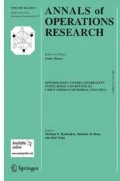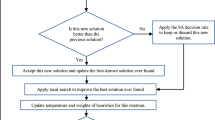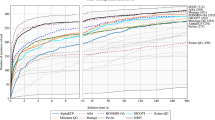Abstract
A scheduling problem with piecewise linear (PL) optimization extends conventional scheduling by imposing a conjunction of combinatorial PL constraints involving the objective function variables. To solve this problem, this paper presents a hybrid algorithm where Constraint Programming (CP) search is supported and driven by a (integer) linear programming solver running on a well-controlled subproblem which is dynamically tightened. The paper discusses and compares different ways of decomposing the problem constraints between the CP search and the solver. We show how the subproblem structure and the piecewise linearity are exploited by the search.
Similar content being viewed by others
References
A. Aggoun and N. Beldiceanu, Extending CHIP in order to solve complex scheduling and placement problems, Journal of Mathematical Computer Modelling 17(7) (1993) 57–73.
M. Bartusch, R.H. Möhring and F.J. Radermacher, Scheduling project networks with resource constraints and time windows, Annals of Operations Research 16 (1988) 201–240.
E.M.L. Beale and J.A. Tomlin, Special facilities in a general mathematical system for non-convex problems using ordered sets of variables, in: Proc. of the Fifth International Conference on Operations Research (Tavistock Publications, London, 1970) pp. 447–445.
D. Bertsimas, Ch. Darnell and R. Soucy, Portfolio construction through mixed-integer programming at Grantham, Mayo, van Otterloo and Co, Interfaces 29(1) (1999) 49–66.
D. Chapman, Planning for conjunctive goals, Artificial Intelligence 32 (1987) 333–377.
CPLEX, CPLEX Manual (1999), URL: http://www.cplex.com.
G.B. Dantzig, Linear Programming and Extensions (Princeton University Press, Princeton, NJ, 1963).
R. Dechter, I. Meiri and J. Pearl, Temporal constraint networks, Artificial Intelligence 49 (1991) 61–95.
H. El Sakkout and M. Wallace, Probe backtrack search for minimal perturbation in dynamic scheduling, Constraints 5(4), Special Issue on Industrial Constraint-Directed Scheduling (2000).
R. Fourer, A Simplex algorithm for piecewise-linear programming III: Computational analysis and applications, Mathematical Programming 53 (1992) 213–235.
R. Fourer and D.M. Gay, Expressing special structures in an algebraic modeling language for mathematical programming, ORSA Journal on Computing 7 (1995) 166–190.
J.K. Ho, A successive linear optimization approach to the dynamic traffic assignment problem, Transportation Science 14 (1980) 295–305.
J.K. Ho, Relationships among linear formulations of separable convex piecewise-linear programs, Mathematical Programming Study 24 (1985) 126–140.
J.P. Ignizio, Goal Programming and Extensions (Lexington Books, Lexington, MA, 1976).
G.L. Nemhauser, E.L. Johnson and I.R. de Farias, A generalized assignment problem with special ordered sets: A polyhedral approach, to appear in the Journal of Mathematical Programming.
G. Ottosson, E.S. Thorsteinsson and J.N. Hooker, Mixed global constraints and inference in CLP-IP solvers, Annals of Mathematics and Artificial Intelligence 34(4) (2002) 271–290.
P. Refalo, Tight cooperation and its application in piecewise-linear optimization, in: Proc. of the 5th International Conference of Principles and Practice of Constraint Programming (CP'99), Alexandria, VA, October 1999, Lecture Notes in Computer Science, Vol. 1713 (Springer, New York, 1999) pp. 375–389
M.J. Schniederjans, Goal Programming: Methodology and Applications (Kluwer Academic, Boston, MA, 1995).
H.P. Williams, Model Building in Mathematical Programming, 3rd revised edn. (Wiley, New York, 1994).
Author information
Authors and Affiliations
Rights and permissions
About this article
Cite this article
Ajili, F., El Sakkout, H. A Probe-Based Algorithm for Piecewise Linear Optimization in Scheduling. Annals of Operations Research 118, 35–48 (2003). https://doi.org/10.1023/A:1021897321637
Issue Date:
DOI: https://doi.org/10.1023/A:1021897321637




